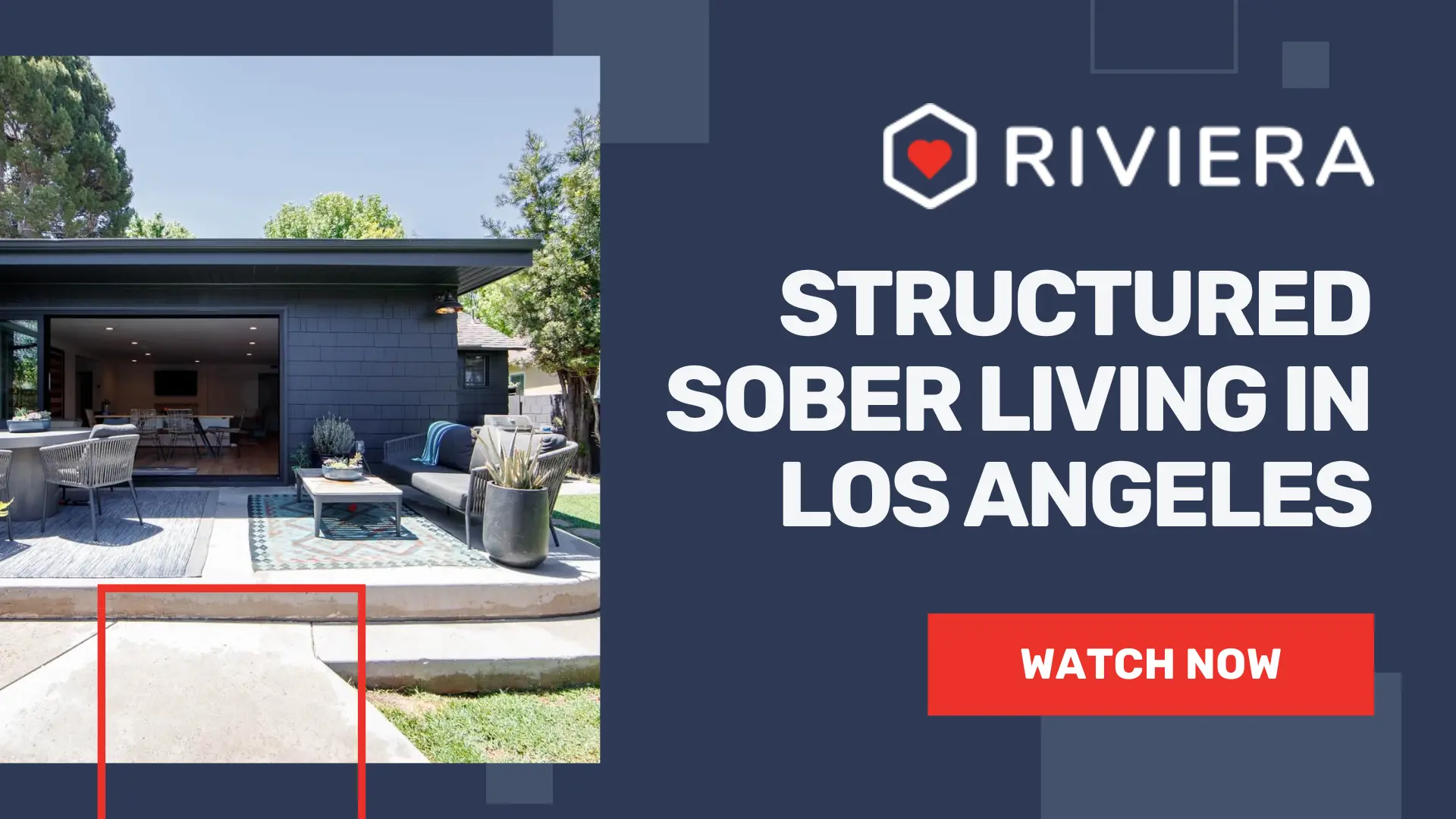Addiction is a disease that affects millions of people globally. It is characterized by a solid and persistent urge to use drugs and alcohol or engage in other harmful behavior, despite the consequences. In Los Angeles, addiction has become a prevalent issue, affecting people from all walks of life. While various treatment forms are available for addiction, not everyone succeeds in traditional rehabilitation centers. That’s where structured sober living comes in as a new path to wellness for those struggling with addiction.
What is Structured Sober Living?

Structured sober living is a form of recovery that provides a supportive and structured environment for individuals recovering early from addiction. It is designed to help individuals transition from treatment to independent living and to prevent relapse. Sober living homes offer a safe and secure environment for individuals to continue their recovery while they work to reestablish their lives.
The benefits of Structured Sober Living
A Safe and Secure Environment:
Structured sober living homes provide a safe and secure environment for individuals in early recovery. This is especially important for those in the initial stages of their recovery, as they may be more vulnerable to relapse. By living in a sober environment, individuals are surrounded by like-minded individuals committed to recovery. This support network can help to keep individuals accountable and on track with their recovery goals.
Increased Support and Accountability:
Structured sober living homes provide a supportive environment for individuals in early recovery. This includes individual and group therapy sessions, support from a recovery coach, and regular participation in 12-step programs. The increased support and accountability provided by structured sober living homes can help individuals stay on track with their recovery goals and reduce the risk of relapse.
A Pathway to Independence:
Structured sober living provides a pathway to independence for individuals in early recovery. It allows individuals to work on developing the skills they need to live a successful, drug-free life while they are still in a supportive environment. Over time, individuals can learn to take responsibility for their recovery and develop the confidence they need to succeed independently.
A Cost-Effective Alternative:
Structured sober living is a cost-effective alternative to traditional rehabilitation centers. It provides individuals with the support and resources they need to recover from addiction without breaking the bank. This is especially important for those in early recovery, as they may struggle to recover financially.
Why Los Angeles Needs Structured Sober Living
Los Angeles is a city that is deeply affected by addiction. According to a recent study, over 8% of the population in Los Angeles struggles with substance abuse. It is a significant portion of the people, highlighting the need for effective addiction treatment in the area.
While various treatment forms are available for addiction, not everyone succeeds in traditional rehabilitation centers. Structured sober living provides a new path to wellness for those struggling with addiction in Los Angeles. It offers a safe and secure environment, increased support and accountability, a pathway to independence, and a cost-effective alternative to traditional rehabilitation centers.
Understanding the Need for Structured Sober Living in Los Angeles
In this section, you could discuss why structured sober living is particularly needed in Los Angeles. You could touch on the high rates of addiction in the city, the limitations of traditional rehabilitation centers, and why structured sober living is a solution that addresses these issues.
The Different Types of Structured Sober Living Homes in Los Angeles
This section explains the different types of structured sober living homes available in Los Angeles. You could discuss gender-specific homes, homes for individuals with specific needs (such as those who are homeless or have a dual diagnosis), and homes that cater to different populations (such as young adults or seniors).
The Importance of a Structured Sober Living Environment
In this section, you could emphasize the benefits of structured sober living and how it helps individuals recover. You could discuss how structured sober living provides a supportive environment, encourages personal growth and development, and helps individuals learn to live a successful, drug-free life.
How Structured Sober Living Can Help Prevent Relapse
Relapse is a common issue for individuals in early recovery. In this section, you could discuss how structured sober living helps to prevent relapse. You could touch on the increased support and accountability provided by sober living homes, the development of healthy coping skills, and the establishment of a strong support network.
Making the Transition from Structured Sober Living to Independent Living
In this section, you could discuss individuals’ next steps after completing their time in structured sober living. You could talk about how structured sober living provides a pathway to independence and how individuals can continue to work on their recovery as they transition to independent living.
What is a Structured Sober Living Home?
A structured sober living home is a community-based arrangement designed to help individuals in recovery maintain their sobriety and transition back into independent living. These homes offer a safe and supportive environment for residents, free from drugs and alcohol, and provide structure, support, and accountability to help residents stay on track with their recovery goals.
Types of Structured Sober Living Homes in Los Angeles
There are several different types of structured sober living homes in Los Angeles, each with its unique approach to helping individuals recover. Some of the most common types include:
Men’s Sober Living Homes
Men’s Sober Living Homes are structured, sober living homes that provide a safe and supportive environment for men in early recovery from substance abuse. These homes are designed to help men maintain their sobriety and transition into independent living, offering a structured and supportive environment free from drugs and alcohol.
Residents of men’s sober living homes typically live together in a shared living space and are expected to follow specific rules and guidelines to maintain their sobriety. This may include participating in household chores, attending daily meetings and support groups, and maintaining a drug- and alcohol-free environment.
Women’s Sober Living Homes

Women’s Sober Living Homes are structured, sober living homes that cater specifically to women in early recovery from substance abuse. These homes provide a safe and supportive environment for women, free from drugs and alcohol, and are designed to help them maintain their sobriety and transition back into independent living.
Women’s sober living homes may offer a range of support and resources to help residents stay on track with their recovery goals, including daily meetings, group therapy, and access to addiction specialists and healthcare professionals.
Living in a women’s sober living home provides a unique opportunity for women in recovery to connect with other women who are facing similar challenges, offering a sense of community and support as they work to achieve lasting sobriety.
LGBTQ+ Sober Living Homes
LGBTQ+ Sober Living Homes are structured, sober living homes that cater to individuals who identify as lesbian, gay, bisexual, transgender, and queer/questioning and offer a safe and supportive environment for their recovery journey.
These homes provide a unique opportunity for LGBTQ+ individuals in recovery to connect with others who share similar experiences and challenges, offering a sense of community and support as they work to achieve lasting sobriety.
In addition to providing a supportive living environment, LGBTQ+ sober living homes may also offer additional resources and support to help residents stay on track with their recovery goals, including daily meetings, group therapy, and access to addiction specialists and healthcare professionals.
Religious Sober Living Homes
Religious Sober Living Homes are structured, sober living homes that incorporate spiritual or religious principles into the recovery process. These homes provide a safe and supportive environment for individuals in early recovery from substance abuse and offer a structured and supportive environment free from drugs and alcohol.
Residents of religious sober living homes may be expected to follow certain religious or spiritual practices and beliefs, such as attending church services, participating in prayer and meditation, or studying religious texts. In addition to providing a supportive living environment, these homes may also offer additional resources and support to help residents stay on track with their recovery goals, including daily meetings, group therapy, and access to addiction specialists and healthcare professionals.
Luxury Sober Living Homes
These homes offer a high-end experience with upscale amenities, private rooms, and personalized support.
12-Step Sober Living Homes

These homes follow the principles of the 12-step program popularized by Alcoholics Anonymous, providing a structured environment for residents to work through the steps.
Non-12-Step Sober Living Homes
These homes offer alternative approaches to recovery that don’t rely on the 12-step program, often incorporating evidence-based practices and a holistic approach to healing.
Choosing the Right Sober Living Home for You
When choosing a structured sober living home in Los Angeles, it’s essential to consider your individual needs, preferences, and recovery goals. Factors such as location, cost, amenities, and approach to recovery may all play a role in your decision.
Sober Living at Riviera Recovery
Addiction is a disease that affects millions of people globally, and it is especially prevalent in Los Angeles. Structured sober living at Riviera Recovery provides a new path to wellness for those struggling with addiction, offering a safe and secure environment, increased support and accountability, a pathway to independence, and a cost-effective alternative to traditional rehabilitation centers. By providing individuals with the support they need to recover from addiction, structured sober living can help reduce addiction’s impact in Los Angeles and beyond.



